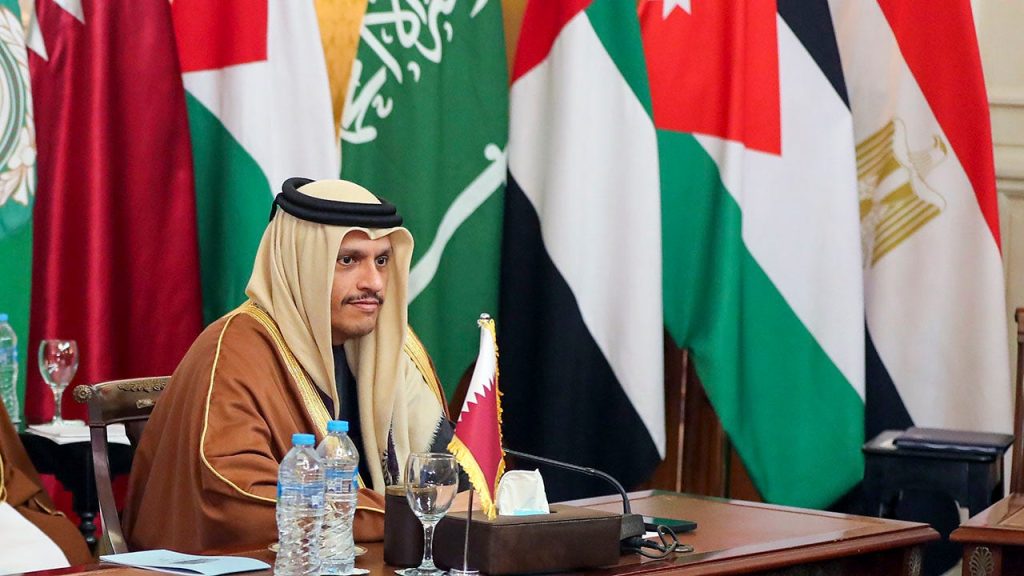Paragraph 1: Arab League Rejects Palestinian Relocation Proposal
A coalition of influential Arab nations, including Qatar, Jordan, the United Arab Emirates, Saudi Arabia, and Egypt, along with key Palestinian and Arab League representatives, convened in Cairo on Saturday to address critical regional issues, primarily focusing on the ongoing Israeli-Palestinian conflict and its aftermath. The resultant joint statement unequivocally rejected President Trump’s suggestion of relocating Palestinians from Gaza to Egypt and Jordan. This proposal, initially floated by Trump in October and reiterated more recently, envisioned the movement of approximately 1.5 million Palestinians out of the war-torn Gaza Strip. The Arab League’s rejection underscores the sensitivity and complexity of the issue, emphasizing the Palestinians’ right to remain on their land and highlighting the potential for such a move to destabilize the region further.
Paragraph 2: Reaffirming Palestinian Rights and Regional Stability
Central to the Arab League’s statement was a firm commitment to upholding the rights of the Palestinian people, including their right to self-determination and their right to live on their land. The statement condemned actions that violate these rights, specifically referencing Israeli settlement activities, home demolitions, land annexation, and the forced displacement of Palestinians. The ministers warned that any attempt to transfer or uproot Palestinians, regardless of the justification, would not only exacerbate existing tensions but also threaten the fragile stability of the region and undermine the prospects for a peaceful resolution to the long-standing conflict. This stance reflects a broad consensus within the Arab world about the importance of preserving Palestinian rights as a cornerstone of regional peace.
Paragraph 3: Supporting the Ceasefire and the Two-State Solution
While rejecting the relocation proposal, the Arab League expressed support for the recently brokered ceasefire agreement between Israel and Hamas, a deal facilitated by Qatar, Egypt, and the United States. This agreement, which includes a hostage release component, represents a critical step towards de-escalation and provides a window of opportunity for further dialogue and peacebuilding efforts. Furthermore, the Arab League reiterated its commitment to working with the Trump administration to achieve a just and comprehensive peace in the Middle East based on the two-state solution. This commitment underscores the continued belief in a negotiated settlement as the only viable path towards a lasting resolution to the Israeli-Palestinian conflict.
Paragraph 4: Trump’s Insistence and Regional Opposition
Despite the clear rejection from both Jordan and Egypt, President Trump remained confident in his proposal, expressing his belief that both countries would ultimately accept Palestinians from Gaza. This unwavering stance contrasts sharply with the positions of Egyptian President Abdel Fattah El-Sisi and Jordanian Foreign Minister Ayman Safadi, both of whom have explicitly rejected the relocation idea. El-Sisi reiterated his commitment to the two-state solution and emphasized that relocating Palestinians was not a viable option. Safadi’s opposition has also been firm and consistent, reflecting Jordan’s concerns about the potential impact of such a move on its own stability and demographics.
Paragraph 5: UNRWA’s Role and Israeli Actions
The Arab League’s statement also addressed the crucial role of the United Nations Relief and Works Agency for Palestine Refugees in the Near East (UNRWA). The statement affirmed UNRWA’s pivotal and irreplaceable role in providing essential services to Palestinian refugees and rejected any attempts to diminish or bypass its mandate. This comes in the wake of Israel’s recent decision to order UNRWA to cease operations within its borders, citing alleged ties to Hamas. This move has drawn international backlash and raises concerns about the future of humanitarian aid and services for Palestinian refugees.
Paragraph 6: The Path Forward and Underlying Tensions
The converging viewpoints of the Arab League represent a unified front against the proposed relocation of Palestinians, emphasizing the need for a resolution based on established international norms and the two-state solution. The divergence between President Trump’s perspective and the consensus within the Arab world exposes a fundamental disagreement on how to address the complex challenges in the region. The focus remains on achieving a lasting peace, but the path forward remains fraught with obstacles, particularly given the ongoing tensions surrounding the status of Gaza, the role of international organizations like UNRWA, and the differing visions for the future of the Palestinian people. The fragile ceasefire agreement offers a glimmer of hope, but substantial diplomatic efforts will be required to navigate these challenges and build a sustainable peace.















